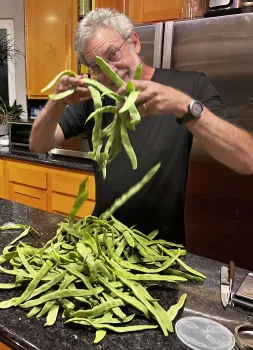Henry Shaw UC Master Food Preserver Online Program Volunteer
County of residence: Contra Costa

Image credit: Henry Shaw, 2025.
My love of food and cooking began as a small child at my mother’s side in the kitchen. Over the decades, both my culinary interests and kitchen skills have grown considerably. My spouse (also a member of the MFP Class of 2024) and I are avid foodies who love to garden, forage, and cook. We often share our garden’s bounty and kitchen creations with friends and colleagues. Becoming a volunteer with the UC Master Food Preserver (MFP) Online Delivery Program has been a natural and fun way to deepen our knowledge of food preservation and share it with others through online classes and publications.
I grew up in a family that always had a vegetable garden. My second-generation Italian mother used simple preservation methods like freezing (stews, chicken stock, and pasta sauce were staples) and drying herbs such as parsley, thyme, and what was then considered the “exotic” basil. This was 1960s New England—where basil truly was an uncommon ingredient! Canning, however, wasn’t something we did.
My passion for gardening and cooking went on pause during my high school and college years, but I rekindled while in graduate school in Pasadena, CA. Along with a few classmates, I dug up the backyard of our rental house to plant a large vegetable garden. It was so much easier to grow things there than it was in short growing season and rocky soils of New England!
In more recent years, I’ve maintained a year-round garden that produces more than we can possibly eat. That abundance led me to learn food preservation techniques such as canning high-acid foods, dehydrating fruits and vegetables, and freezing low-acid foods. Although I had used pressure cookers to speed up the making of stews and other dishes that usually require long cooking times, I had never pressure canned before becoming an MFP.
I retired in the fall of 2019 after a 36-year career as a research scientist and R&D manager at Lawrence Livermore National Laboratory. I immediately began volunteering at the Exploratorium in San Francisco and at our local library. I investigated becoming a UC Master Gardener, but I had missed the application window that year. Then, in March 2020, COVID-19 shut everything down and the world shifted to being online. Looking back, that shift turned out to be a good thing because I learned of the existence of the UC Master Food Preserver Program from a UCANR “EATLAC” online webinar series on the Science of Fermentation. I quickly investigated the possibility of becoming an MFP volunteer but was disappointed to learn that my county (Contra Costa) does not have an MFP Program. Nevertheless, I added my name and e-mail to a contact list in the event an opportunity became available to me in the future.
I did end up becoming a UC Master Gardener in the first post-COVID class of 2022 and in late 2023, more than a year and a half after putting my name on the MFP contact list, I received an e-mail inviting me to apply for a new MFP Online Delivery Program. Needless to say, I jumped at the opportunity.
As a graduate of the Online Delivery Program’s first class, I’ve been able to volunteer in many ways: serving as copy editor for this Newsletter; teaching online classes on preserving pomegranate and feijoa; joining several “Ask a Master Food Preserver” online panels; and co-leading our social media efforts (including creating most of our Facebook posts). I’m also preparing to lead a new statewide Food Preservation Helpline.
In my “spare time”, I continue to volunteer at the Exploratorium, as a UC Master Gardener, and as a Board member (past-President and current Vice President) of a local orchid society. My wife and I are also enthusiastic foragers of edible mushrooms and seaweed—though I admit she’s more into the latter than I am. Retirement is good, and as many retirees say, I don’t know how I ever found the time to work!
